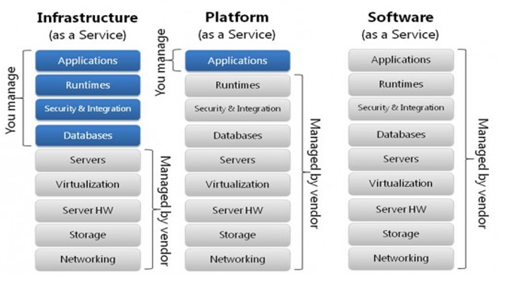What is Cloud Foundry? Key benefits and a real use case
First of all though, to be completely clear, just what is a Cloud Computing platform? There are, broadly speaking, three major categories of Cloud Computing:
- Infrastructure as a Service (IaaS) : which provides only a base infrastructure, leaving the end user responsible for platform and environment configuration necessary to deploy applications. Amazon’s AWS and Microsoft Azure are prime examples of IaaS.
- Software as a Service (SaaS) : like Gmail or Salesforce.com.
- Platform as a Service (PaaS) : which helps to reduce the development overhead (environment configuration) by providing a ready-to-use platform. PaaS services can be hosted on top of infrastructure provided by an IaaS.

Since it’s easy to become a bit confused when thinking about cloud platforms, it’s important to be able to visualize exactly which elements of the compute ecosystem are whose responsibilities. While there is no precise definition, it’s reasonable to say that a platform requires only that you take care of your applications.
With that in mind, the platform layer should be able to provide:
- A suitable environment to run an application.
- Application life cycle management.
- Self-healing capacity.
- Centralized management of applications.
- Distributed environment.
- Easy integration.
- Easy maintenance (upgrades etc).
What is Cloud Foundry?
Cloud Foundry is an open source cloud platform as a service (PaaS) on which developers can build, deploy, run and scale applications on public and private cloud models. VMware originally created Cloud Foundry and it is now part of Pivotal Software.
Developers choose Cloud Foundry for its free, open source nature and for the ability to use their own tools and code. Similar platforms and competitors to Cloud Foundry include OpenShift, Google App Engine and Heroku.
For infrastructure management, Cloud Foundry uses BOSH, an open source tool for deployment and lifecycle management.
The Cloud Foundry Foundation’s goal is to use the innovations of the community to create an agile platform for cloud-native applications and software.
Cloud Foundry is optimized to deliver…
- Fast application development and deployment.
- Highly scalable and available architecture.
- DevOps-friendly workflows.
- Reduced chance of human error.
- Multi-tenant compute efficiencies.
Not only can Cloud Foundry lighten developer workloads but, since Cloud Foundry handles so much of an application’s resource management, it can also greatly reduce the overhead burden on your operations team.
Key benefits of Cloud Foundry: Application portability, Application auto-scaling, Centralized platform administration, Centralized logging, Dynamic routing, Infrastructure security, Provision for vertical and horizontal scaling etc..
Getting Started with Cloud Foundry :
Source : Cloudacademy : By Vineet Badola